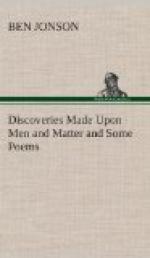Of the two (if either were to be wished) I would rather have a plain downright wisdom, than a foolish and affected eloquence. For what is so furious and Bedlam like as a vain sound of chosen and excellent words, without any subject of sentence or science mixed?
Optanda.—Thersites Homeri.—Whom the disease of talking still once possesseth, he can never hold his peace. Nay, rather than he will not discourse he will hire men to hear him. And so heard, not hearkened unto, he comes off most times like a mountebank, that when he hath praised his medicines, finds none will take them, or trust him. He is like Homer’s Thersites.
[Greek text]; speaking without judgement or measure.
“Loquax magis, quam facundus,
Satis loquentiae, sapientiae parum.{31a}
[Greek verse]. {31b}
Optimus est homini linguae thesaurus, et ingens
Gratia, quae parcis mensurat singula verbis.”
Homeri Ulysses.—Demacatus Plutarchi.—Ulysses, in Homer, is made a long-thinking man before he speaks; and Epaminondas is celebrated by Pindar to be a man that, though he knew much, yet he spoke but little. Demacatus, when on the bench he was long silent and said nothing, one asking him if it were folly in him, or want of language, he answered, “A fool could never hold his peace.” {31c} For too much talking is ever the index of a fool.
“Dum tacet indoctus, poterit cordatus haberi;
Is morbos animi namque tacendo tegit.” {32a}
Nor is that worthy speech of Zeno the philosopher to be passed over with the note of ignorance; who being invited to a feast in Athens, where a great prince’s ambassadors were entertained, and was the only person that said nothing at the table; one of them with courtesy asked him, “What shall we return from thee, Zeno, to the prince our master, if he asks us of thee?” “Nothing,” he replied, “more but that you found an old man in Athens that knew to be silent amongst his cups.” It was near a miracle to see an old man silent, since talking is the disease of age; but amongst cups makes it fully a wonder.
Argute dictum.—It was wittily said upon one that was taken for a great and grave man so long as he held his peace, “This man might have been a counsellor of state, till he spoke; but having spoken, not the beadle of the ward.” [Greek text]. {32b} Pytag. quam laudabilis! [Greek text]. Linguam cohibe, prae aliis omnibus, ad deorum exemplum. {33a} Digito compesce labellum. {33b}
Acutius cernuntur vitia quam virtutes.—There is almost no man but he sees clearlier and sharper the vices in a speaker, than the virtues. And there are many, that with more ease will find fault with what is spoken foolishly than can give allowance to that wherein you are wise silently. The treasure of a fool is always in his tongue, said the witty comic poet; {33c} and it appears not in anything more than in that nation, whereof one, when he had got the inheritance of an unlucky old grange, would needs sell




